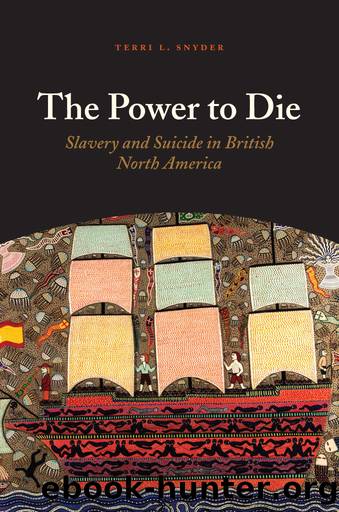The Power to Die by Terri L. Snyder

Author:Terri L. Snyder [Snyder, Terri L.]
Language: eng
Format: epub
Tags: History, General, United States, Colonial Period (1600-1775), Social Science, Ethnic Studies, American, African American & Black Studies
ISBN: 9780226280738
Google: 6hBDCgAAQBAJ
Publisher: University of Chicago Press
Published: 2015-08-28T03:12:51+00:00
6.1. Songs were written using The Dying Negro as their title. The lyrics elided references to suicide or self-destruction and described death as a welcome friend. Source: Music Collections, The British Library Board, London. The Dying Negro: A Much Admired New Song, By Mr. Hook. Published by Him at his Musical Circulating Library (Dublin, 1800).
The Dying Negro used the guise of an autobiographical epistle, but its protagonist did not, of course, compose the poem. Yet like later eighteenth-century slave narratives, most notably the account of Olaudah Equiano, The Dying Negro recounts the protagonistâs African origins and his capture by Europeans before describing the cruelty of separation from his homeland and the brutality of labor regimes in the Americas.43 After suffering these hardships, however, he sees a chance for liberty when he travels with his owner to London, where, once on British soil, as he believes is his right, he runs away to claim his freedom. According a contemporaneous issue of the Virginia Gazette, the belief that there was no slavery in England was âprevalentâ among American slaves.44 In order to allow readers to understand the protagonistâs choice of death over slavery, the first chord The Dying Negro strikes is the denial of natural rights: the unnamed slave has the right to chose death over the tyranny of slavery. As he explains, slavery is an erasure of personhood: slavery is like âbecoming a thing without a nameâ in a traffic directed by those who lust for gold. He has a natural right to refuse the tyranny constituted by that erasure.45 According to Brycchan Carey, this was âprobably the first time many people had come acrossâ a natural rights argument against slavery.46
In addition to the political currency of natural rights philosophy, The Dying Negro struck a note with a religious readership as well. The poem treats the protagonistâs suicide as a moral response to the sinfulness of slavery.47 Civilized readers were to fear Godâs âdreadful mercyâ; and yet the unnamed slaveâs power to die was depicted as divinely sanctioned. âFlashing lightningâ is a âdreadful signâ that God approves of the suicide. In the last stanza, the slave notes that it was at Godâs âgreat callâ that he has âspiltâ his being.48 The idea that God approved of suicide was a radical one in terms of Anglo-American law and religion. In this sense, the writers framed the slave as a religious martyr who died in the service of a greater good. How this played with an Anglo-American audience, however, is less than clear. In England, where the poem was first published, the traditional penalties for suicideâforfeiture, profane burial, postmortem desecrationâpersisted longer than elsewhere in Europe, well into the nineteenth century, despite escalating arguments for decriminalization.49 Criminal suicide remained on the books in some North American jurisdictions until after the American Revolution.50
At the same time, some phrases in the poem echoed the traditional religious condemnation of suicide. Portions of the poem, for instance, have double meanings that reveal tensions between longstanding beliefs that suicide
Download
This site does not store any files on its server. We only index and link to content provided by other sites. Please contact the content providers to delete copyright contents if any and email us, we'll remove relevant links or contents immediately.
Through Windows of Opportunity : A Neuroaffective Approach to Child Psychotherapy by Marianne Bentzen; Susan Hart(964)
Overcoming ADHD Without Medication : A Guidebook for Parents and Teachers by Children and Natural Psychology Association for Youth; Children The Association for Youth(900)
Out of the Mainstream: Helping the Children of Parents with a Mental Illness by Loshak Rosemary;(893)
Delphi Collected Works of Sigmund Freud (Illustrated) by Sigmund Freud(657)
The Noom Mindset by Noom(595)
The 48 Laws of Mental Power: Overcoming Trauma and Building Mental Strength by Victor O. Carl(565)
The Psychology of Media and Politics by George Comstock & Erica Scharrer(485)
Sigmund Freud by Janet Sayers;(483)
MANIPULATION & MIND CONTROL: The Persuasion Collection: Dark Psychology Secrets, Analyze & Influence People with Nlp. How to learn Reading Friends and Develop Body Language Skills. by ROBERT TOWER(467)
It's nobody's fault: new hope and help for difficult children and their parents by Harold Koplewicz(451)
Totem and Taboo: Some Points of Agreement between the Mental Lives of Savages and Neurotics by Sigmund Freud(446)
Behold the Monster by Jillian Lauren(443)
The Hypnotic Coach: A Conversational Hypnotherapy Tool Kit by Marion Jess(423)
Directions in Technical Writing and Communication by Gould Jay R.;(413)
Mastering Flow: Perform Better, Experience More Joy, and Live a Happier Life by Nils Salzgeber(408)
THE PSYCHOLOGY OF ENTREPRENEURSHIP; New Perspectives by Michael M. Gielnik; Melissa S. Cardon; Michael Frese(391)
Positive Psychology Across the Lifespan; An Existential Perspective by Piers Worth(364)
The Modern Young Man's Guide to Manhood by Wayne Walker(360)
Mind Hacking Secrets and Unlimited Memory Power: 2 Books in 1: Learn How to Improve Your Memory & Develop Fast, Clear Thinking in 2 Weeks + 42 Brain Training Techniques & Memory Improvement Exercises by Sharp Scott(359)
